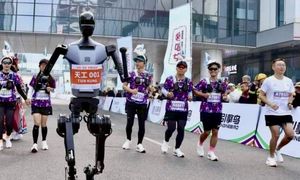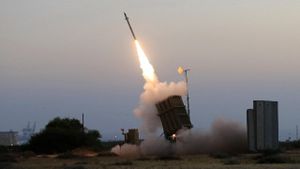The Democratic Republic of the Congo (DRC) is facing one of the most severe escalations of conflict seen in recent years, as violence erupts between the M23 rebel group and government forces. The M23, with alleged support from Rwanda, has captured Goma, the capital of North Kivu province, leading to alarming humanitarian consequences and devastating loss of life.
According to reports from the United Nations, at least 773 deaths have been confirmed since the fighting intensified, with thousands more injured. The UN's spokesperson, Stéphane Dujarric, indicated, "We have verified 700 people have been killed and 2,800 injured during this period of conflict. Sadly, we foresee these numbers climbing even higher." This surge of violence is putting immense pressure on the already strained healthcare system, and without urgent intervention, the situation is poised to worsen dramatically.
Eyewitness accounts from the city reflect the desperate conditions inflicted upon civilians. Local government spokesperson Patrick Muyaya shared observations from the chaos, stating, "These figures remain provisional because the rebels asked the population to clean the streets of Goma. There should be mass graves and the Rwandans took care to evacuate theirs." This grim outlook has left communities fearful as they navigate the aftermath of intense conflict.
The M23 group's approach is marked by brutality. Reports emerged of extrajudicial killings, forced conscription, and the occupation of facilities such as schools and hospitals. UN officials documented at least 12 extrajudicial executions carried out by M23 fighters between January 26 and 28. UN High Commissioner for Human Rights Volker Turk accentuated the escalation, saying, "Conflict-related sexual violence has been a tragic feature of the violence in eastern DRC for many years. This latest escalation only increases the risk for more atrocities."
Another dimension of the conflict is the troubling reports of sexual violence, with UN investigations confirming at least 52 incidents involving Congolese troops. Civilians, particularly women, are increasingly finding themselves at risk, and the humanitarian crisis from the rampant violence is compounded by already overwhelming needs.
Compounding these issues is the fact Goma has served as a pivotal humanitarian hub, supporting millions of displaced persons across eastern DRC. The capture of the city not only disrupted aid delivery but pushed many residents to flee or barricade themselves for safety. Rose Tchwenko, the country director for Mercy Corps, expressed her concerns, saying, "The escalation of violence toward Bukavu raises fears of even greater displacement. The breakdown of humanitarian access is leaving entire communities stranded without support."
On the political front, the DRC government is struggling to maintain control as M23 forces push southward toward Bukavu, the South Kivu capital. Local efforts are underway to form defensive lines, with soldiers reportedly recapturing some territories. Hundreds of civilian volunteers have joined defense efforts, adamant to protect their homeland. The pervasive sense of fear is evident as one volunteer articulated, "I am ready to die for my country." This sentiment encapsulates the dire stakes residents face.
Internationally, the DRC's Foreign Minister Thérèse Kayikwamba Wagner has made serious allegations against Rwanda, claiming illegal occupation and interference—a sentiment echoed by the Congolese leadership. Meanwhile, Rwanda has denied these claims, stating their troop presence aims to prevent spillover conflict from affecting their territory. The complex historical background involving ethnic tensions and resource contention continues to fuel this conflict, drawing parallels to previous regional conflicts dubbed Africa's World Wars.
The DRC's vast mineral wealth makes it geopolitically significant and highly contested. With international observers alert, there are fears the conflict could spiral beyond DRC's borders once more.
Longtime observers of the DRC situation note how the international community's response has largely been insufficient. UN experts estimate as many as 4,000 Rwandan troops have been operating alongside M23 rebels—a stark reminder of the multifaceted nature of this enduring conflict. The regional body Sadc recently affirmed its commitment to helping the DRC navigate this crisis as it signals support for peacekeeping initiatives. But underlying tensions prevail, raising concerns about the consequences if the fighting expands.
Food shortages prevail as humanitarian aid cannot access Goma and beyond effectively. The UN's World Food Programme has warned residents are running out of food, water, and medical supplies, intensifying the dire humanitarian situation. "The supply chain has really been strangled at the moment... when everything is closed down," said Shelley Thakral from the WFP.
Amidst the tumult, civilians' pleas for security rest on human rights and accountability. UN officials continue to push for compliance with humanitarian laws. High Commissioner Turk called for urgent investigations, underscoring, "We must hold those responsible for these grave abuses accountable—justice and accountability are pivotal to halting the persistent cycles of violence."
The line between war and humanitarian collapse blurs as the DRC stands at yet another crossroads. The international community is urged to intervene, but whether sufficient action is taken remains uncertain as Goma's fate hangs perilously in the balance.



